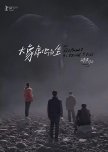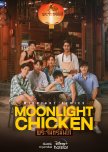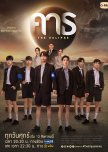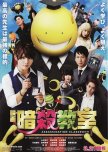
Ghost Girl and My Love
6 personnes ont trouvé cette critique utile
All the feels!
I don't usually like short series since their makers don't seem to be aware of how to present a story in a short time. And then certain series come out which prove that a short run-time isn't an excuse to not create a good storyline!“My Fairy Ghost” is one of those. It makes the most of the limited run time and presents a beautiful story of two women falling in love with each other. The basic plot is that Aizawa is a writer struggling to make ends meet, when she runs into Kei whom she recognises to be a ghost. Aizawa is the only one who can see Kei and as the story progresses, we realise that Kei is the only one who can see Aizawa too.
There was a lot of cuteness and romance packed into this, but it has a very mature tone. This was a story about love with a strong message on what art, or any creation really, is truly about. It is what Kei and Aizawa bond over, it is the "regret" which keeps Kei rooted to the earth.
The actresses brought awesome chemistry to the screen. I cried with Aizawa and could feel Kei's grief. 8/10
Cet avis était-il utile?

An Elephant Sitting Still
6 personnes ont trouvé cette critique utile
The story of a day
“There is an elephant in Manzhouli. It sits there all day long.”And no matter how many people stab it with forks, offer it food, chide it or console it, it does not move. It remains stationary the whole time, throughout its life. It remains still even when life progresses. It remains still when time stops.
“An Elephant Sitting Still” is the first and last film by Hu Bo, who died by suicide soon after its release. It has definitely won "stuff" at film festivals but in terms of camerawork and filmmaking, An Elephant Sitting Still is hardly a masterpiece. It is bleak and grey, mostly the camera follows the heads of our characters as they walk. There is nothing special about it in terms of sound except when the elephant roars.
This entire story of 4 hours is based on a single day. It shows us four extremely different people: a high school boy with an unloving family, his friend who has an affair with the school dean, an old man who isn't given a home in his own house by his own son and a gangster man whose friend commits suicide. All these people are united in the bleakness they are trapped in, and all of them, on the very same day, witness death. And it's amazing how many deaths can occur in a day, and even more surprising is how plausible the story is.
At some point in the movie, I wondered if I was reading a suicide note. Something that is tragic and still and yet, moving forward with a purpose. The human life it fragile and fleeting, no matter what happens, no matter how much you are beaten down, life is forever going ahead and the elephant will still be sitting at Manzhouli.
Despite being bleak, “An Elephant Sitting Still” possesses a timeless grace. Despite having minimal dialogue where the characters seem to speak in broken sentences with even more left unsaid, the characters have a strange connection. Despite being 4 hours long, it is not boring.
Cet avis était-il utile?

A short but not necessarily fast paced romance
Different narratives resonate with different people and Moonlight Chicken has quite a distinct flavour. It is a dose of realism. It tries to pack a mighty punch in these eight hour episodes which span a period of around six months. It tackles many issues that a person could face in today's Thai economy through the lives of the people at a chicken rice diner. Does it work though?Jim, known as Uncle Jim to most, runs a semi-popular rice diner at chinatown in Pattaya city. It's the moon festival and on this fateful night, Jim meets Wen who has drunk and passed out at his shop. Out of a sense a responsibility, he decides to take Wen home and ends up having a one night stand with him. The next day however all it seems is that Jim want to pretend it never happened.
Jim is portrayed as a man who is nearly in his forties. He is not a closeted gay man but his previous relationship has burnt him and he still grapples with his past. Wen is an art director is in his early thirties. His youthful charm and shamelessness in pursuing Jim is a sharp contrast to Jim’s stoic behavior. We soon learn that it's not just Jim who has baggage, Wen has an ex whom he cannot cut off.
Then there's the budding romance of Li Ming (Fourth), Jim’s nephew who lives with him, and Heart, the boy of an influential, rich Thai officer. Heart is Li Ming's opposite in more ways than one, already a slightly introverted individual, Heart is further repressed by the fact that he is deaf. His disability makes him lonely, a loneliness in which he has doesn't have the support of his parents, and Li Ming is a sudden brightness in his life. Gemini and Fourth bring all their adorable sweetness here.
While Jim, Wen and their love quadrilateral represent a more complex, or rather dumb but extremely fraught relationship, Heart and Li Ming are simple. “I like it when I am with you.” They bring the liveliness of young love to the screen. Another couple is Saleng (Mark) and his girlfriend Praew (View) who get themselves into a mess. Through them a very important topic is discussed: unwanted pregnancy and the brunt of raising a baby in this economy (with a small talk on abortion).
The series is directed by my favorite director, P'Aof. While Moonlight Chicken is thematically very different from Bad Buddy, there is still P'Aof’s charm. His charm to portray a story naturally and to bring out the best in the actors. While I do appreciate that the side characters add a lot of goodness to the story, I feel that it was at the cost of the main romance.
The struggles of Jim with his past and Wen with his present were intriguing, but after episode 3 their relationship development became completely stagnant. The story does not resort to using cheap jealousy to keep it spicy, which I thought would be a big issue. The main couple shone the least here. I never really felt Jim reciprocate Wen’s feelings. It is attributed to the fact that Wen is younger and his personality is livelier whereas Jim (at his alleged age of "nearly 40" I hope i look as good at 40 as he does!) but I did not feel a significant shift in their relationship even when there was supposedly a huge shift in their relationship.
Perhaps it is the casting choice which held them back. While Mix did quite well, and Earth does do better than before, I just could not feel their acting. Whatever tension was there in episode 1 is effectively lost by episode 2 (this might seem harsh but it's true, at least for me). I needed Jim to want Wen more than he needs to breathe (okay, maybe that's a bit too much), but all he does is keep pushing him away and wow I honestly cannot imagine sticking around for an emotionally unavailable man for that long, Wen. I, as an audience, failed to see what Wen and Jim saw in each other.
Do not mistake this for a "fast paced romance" because this is absolutely not one, despite the one night stand it started out with. The only reason why I rate it as highly as I have (7/10) is because I love them as a family, all of them including Jim and Wen. They are a huge wholesome family and that is >>>>> 100 times than Jim and Wen's romance. But this may be more of a personal gripe.
Moonlight Chicken does touch on a lot of issues and not just "first world problems" as in most bls and it is mostly successful at doing justice to its characters. A point I found quite significant is when issues are raised, there are quite a few discussions on money, because lets not pretend, money is an important deciding factor in our lives. However in this Moonlight Chicken is not relentless, it does allow our characters to achieve happiness too.
In terms of production value, this is a very aesthetic show. With charming shots it explores the vibrancy of Pattaya’s beaches and temples and festivals. It offers a brief but colourful look into Thai culture. Each episode roughly spans over a month and there is a certain link to the festival being celebrated in each episode that may be a little hard for viewers to follow (at least for me :). The sound quality was okay, the background music doesn't take over the speech, then again it's P'Aof, we really don't need to worry about the production. I wish they had made a different decision about translating Heart though. I understand they wanted to portray the struggle of understanding a deaf-mute man, but even in the final episode there are so many things Heart says which were left unsaid :(
My final takeaway is that I wish Jim and Wen as characters had been more dynamic, they fell rather flat in comparison to the others. Re-watch value? Not that high. Only for Heart and Li Ming! If you are wondering whether to watch this, I'd suggest giving it a go because from what I've already seen, most viewers have very different opinions on this because Moonlight Chicken hits a different tone with different people. And it's short too :) 7/10
Cet avis était-il utile?

Stylistically beautiful, graphically violent but unexpectedly warm
No spoilers. Proceed safely.I was sceptical about watching another Japanese Netflix production because the two I have tried so far haven't been impressive. Well, “Smoking” broke that barrier to say the least. During the 6 hours I have been watching “Smoking,” not only have I been impressed but I have grown quite attached to the story, which is quite weird considering the amount of death and macabre.
❝In the end, people can't be saved. The only thing I can do is to peel away their human facade, and reveal their true nature.❞
“Smoking” was like a violent parable; four men with their individual haunting pasts assassinate people for money and somehow, despite being the bad guys that they are, I formed a bind with them. I feel bad having to quote Vin Diesel, one of America's worst actors from Fast and Furious, one of America’s trashiest movies, while describing “Smoking” but his quote is quite effective here–I don't have friends, I have family.
The four guys of Smoking, Uncle Sabe, Hifumin, Haccho and Goro are not just friends or a team. They have seen each other's darkest sides, their terrible pasts and in a way, have helped each other out of it. Sabe is like the glue which holds them together, going by the name of “The Flayer,” he is the most terrifying of them four. And no matter how many people they murder, there is a certain poetic justice to it which is moving. For such a violent show, this was unexpectedly warm.
This was also really too beautiful. They wonderfully incorporated metaphorical shots and that beige-brown aesthetic that I love. It was also graphically wretched and gut-wrenching.
The story in itself might seem mediocre and the brilliance of “Smoking” lies in its tasteful execution which blends a certain amount of mystery and intrigue, blood and gore and its morally grey characters portrayed by superb actors. Absolutely worth the watch.
Cet avis était-il utile?

Cette critique peut contenir des spoilers
Weed plants, drunk scenes and many more dull, borderline nefarious scenes things are happening here
Edit: I have completed this drama because I don't drop anything to maintain a clear graph and guess what? This is still trash.The points made below still hold. There are also some dub-con scenes which I disliked. I wish I had never started on this.
There is no development, no change. It's s stagnant as a scum-covered eutrophic pool of water.
New rating: 2.0.
-
If this drama were available on YouTube, it would be one of those which I watch at 2× speed and skip every ten seconds. If I'm looking for something mindless and puppy then I turn to university bl series like this, but I see several problems in “Nitiman”.
The basic story is that Bbomb, a law student, has been crushing on his senior, Jin, an engineering student who is supposedly the most handsome guy on campus. The drama revolves around them and their romantic debacles. I'll just list the basic reasons why I dislike this show:
1. RANDOM SHOTS OF WEED
First and foremost, this is something I specifically noticed in episode3, everytime there is a change of scene, the drama incorporated the most random shots of weeds. What were they trying to do? Was it supposed to be scenic? I just ugly laughed when it happened three times in a row on episode 3.
2. EVERY EPISODE HAS A BAR SCENE
No, like seriously. Every episode has a bar scene where Jin or Bbomb gets drunk and then they end up in Jin’s room. How convenient.
3. WHAT'S WITH THE TITLE?
The word 'Niti' means law in both Thai and my own language. Bbomb is a law student. Big brain moment. Is there any other significance to the title then do let me know and I'll readily remedy this.
4. THE BEGINNING JUNGLE BEATS
The intro to the show sounds like a badly done version of the Tarzan. Like seriously, it's jungle beats.
5. BADLY DONE HUMOR
I don't want to get into the nitty gritty of every badly done comedy in this show, I'll elaborate on a particular incident in episode 3. Seeing Jin in a curled up position while sleeping, Bbomb takes it upon himself to straighten his posture so he lifts him up while simultaneously making while scrunching his face. Jin’s brown plush toy is positioned at his groin to resemble his d***. Let's just say that I did not find it funny.
Also, comedy at the expense of a ladyboy or transgender character is something I have developed zero tolerance for.
6. DRUNKEN KISSING
Nope, not two drunk friends kissing each other in a moment of passion. This is Bbomb kissing a drink Jin (who is has at least not passed out). Not only was it drunken and sudden but it was HORRIBLY DONE? I was gagging behind the screen when Bbomb just pressed himself against Jin–like boy no, just no.
7. WHERE'S MY TURBO AND KAOWNAH AT?
I came to know about Turbo and Kaownah during Lovely Writer and I was excited to see their chemistry in this series. Well, their screentime won't even amount to 1% of it. Also they gave them a TinCan storyline with Jay (Turbo) saying that Song (Kaownah) is too dirty to be allowed into his house and then Song rubs his shirt on Jay. Needless to say I was disappointed.
Same for the other side characters. Unless Keam is a polysexual bi/pansexual, I have no idea who he is supposed to be dating. If he is then he's dating everybody here. The side characters don't have any agency or purpose except to serve as a foil to the mains. I suppose they'll be brought in during episode 9 to 10 when Jim and Bbomb are at a good point in their relationship and then yeeted out during episode 11 (when the curse of episode 11 will naturally make it's appearance).
8. DIALOGUE
There's a couple here, Ultra and U, and whenever they make an appearance the only dialogue they use is “Okay, we're leaving first.” Like seriously, that's the only dialogue they had to rehears up till now. Jim and Bbomb’s dialogue has transcended to a level of cringe I cannot tolerate.
9. THE FANS ARE GOING TO BUY IT ANYWAY
If this show is any slower...if I ever got my hands on the script and was made to read it I'm sure I'd get a headache. The script was hasty, direction was plain bad, the acting was subpar (even for a university bl) and everything looked like a collage work. This show reeks of “the fans are going to buy whatever we sell so just churn out 12 episodes”.
10. POSTING ON SOCIAL MEDIA WITHOUT CONSENT
Keam sending pictures of drunk Jin to Bbomb, Jack streaming their 'romantic' moments and crazy shipper fans—i am so done with this show.
11. LOVE PRISM
This is where the SOTUS rip off becomes a bit obvious, there are multiple threads of 'he likes her, but she likes him, but he likes him and he likes him too’ going on here.
12. ACTING
Behold, I am about to begin the rant on my favorite topic (apart from the weed thing), the acting was horrible. I can understand that Noh was probably asked to act like a cardboard pop up as Bbomb but sometimes when he's showing emotions it looks like he's really trying but he just can't. I saw people comparing him to other characters like Kao in UWMA but Kao has a way of communicating with his eyes. Bbomb’s character just fell flat.
As for Jom, he looks so uncomfortable as Jinake sometimes, or perhaps he was asked to act like that. It reminds me of the main couple from 2moons.
I wonder how the acting workshop went, sometimes I feel that these series don't even conduct proper workshops for the actors. A little bit of icebreaking can solve so much. There was a complete lack of chemistry, the actors were just throwing lines around and others like Kaownah who looked like they could pull it off, were sidelined.
Dropped. Trashed. But just to be fair, this is a review up till episode 4. Since this is a dropped title, I WILL NOT BE RATING IT. Of noteworthy mention (because I like ending things on a positive note), Jom has an exceptional talent. The way he bit off half of a whole ice cream like that—my sensitive ass teeth could never—
Cet avis était-il utile?

A wastage of a great cast
The Eclipes is a wannabe ”The Gifted”, minus the fantasiacal aspect of the series and most importantly, minus the strongest aspect of The Gifted, an actual enemy.We have Akk, the perfect school boy and prefect, under the command of Teacher Chadok. His one and only motive is to uphold the reputation of Suppalo as the top school in Thailand. The biggest obstacles in his path are a trio of protestors who demand that the school rules be modified to a modern version which supports students more in their endeavour to be freer. A new addition is the new school boy Aye who is from the rival top school in the country.
Akk, who idolises his predecessor school prefect and worships Teacher Chadok does his best to stop these nefarious elements but Aye is a new sort of obstacle. He's somebody Akk can't figure out. And his own feelings whenever he's around the cocky Aye are a jumble of "I hate him" and getting alternately flustered and impressed by Aye's shamelessness and outrageous courage. And as Akk falls first, Aye too can't help being drawn to this school prefect who seems to be so perfect on the outside but is crumbling on the inside.
I have nothing but admiration for Kahotung and First. This is both of theirs, as I would call it, "first proper main roles". Tonhon Chonlattee (Khaotung's first main role) and The Shipper (First's first main role) were a huge disservice to these actors and a painful memory most viewers wanted to erase. They brought the best of themselves to the screen here.
Broken souls recognise one another and Aye sees just another lost boy in Akk. They become a safe space for each other as Aye tries to unveil the mystery behind his uncle Dika’s suicide, who is known as a traitor in Suppalo, while Akk tries to deal with his emotions and newfound revolutionary ideologies.
That brings me to my biggest problem with The Eclipse. Where. Is. The. Plot. I loved how they presented Akk and Aye with the "us against the world trope" but it all kind of falls flat when you wonder what are they even fighting for? Aye for one isn't into the protest, he's just trying to find out about his uncle and thinks the protest is linked to it. He does have a strong free will and reads 1984 and all so there's that, however he does not join or take a leadership role in the protest.
For Akk this is a part of his character development. He has a huge redemption arc which is done so very well that I wonder why on earth these script writers couldn't come up with a better story line because all I see are some dumbass teenagers who want to wear chokers and slashed jeans to school.
The "dumbass teenagers" as I call them face near death experiences attributed to the "Suppalo curse" and eventually we stop focussing on the protest against the rules and turn to a protest to find the one behind the curse. This of course makes more sense as the school did not investigate properly into who was behind those actions, but I can’t help but feel annoyed at how the rules were just brushed over. Without an idea of the rules, without an understanding of the alleged infringement on their rights, I feel no sympathy for these kids at all. I am even more mystified by the behaviour of these adults who actually catalyse the protest with how they deal with the protestors. Call their parents suspend them and send them home. Done!
There is no real enemy in The Eclipse. Even Teacher Chadok is later made out to be a victim of sorts. Uncle Dika’s death is unrelated to all this. It's like the writers didn't know what to do with the story and end the protest so they took a random left turn into shitville ending. There's a grand exposé which yes, I did not see that one coming, given how utterly stupid it was.
After twelve episodes if you ask me what was it all even about I'd say Akk and Aye because they were truly the only thing this drama had to offer. There were portrayals of suicidal thoughts, onscreen suicide and open talks on depression (Trigger Warnings for these) which I definitely appreciated; this is yet another gmmtv series which has been very positive about being lgbt.
There is a side gay couple who made for cute filler scenes but in the very end the inconsistent actions of one of them, followed by the poor explanations he had to offer, ruined their story for me too.
As a character driven drama, The Eclipse is definitely great but the plot aspect is not so much and ultimately character growth does derive from the plot so I suggest leaving your brain at the door for this one.
It is very hard for me to rate The Eclipse.
Story? Giving it a 5/10 as a compromise for how poor the plot was but how well written the character arcs were.
Acting? Have a 8.5/10. KhaoFirst, you dropped your crowns, hope there are more main roles projects for them in the future. I take points off because the side actors were so bad, particularly Teacher Chadok.
Music? Nothing spectacular but The Eclipse does not have the sound effects which many viewers dislike and the background noise balance is way better. I noticed it during the beach scenes where in most dramas the waves usually sound too loud.
As for re-watch value, I will rewatch certain Akk and Aye episodes. The second book in this series is in the works but if a second season is ever made (can't imagine why), I don't think I'll be watching it. I don't regret watching The Eclipse but the drama in itself is very forgettable and the worse part is that it could've easily been so much better.
Cet avis était-il utile?

Of reeds that bend but do not break.
No spoilers. Proceed safely. There trigger warnings listed at the end of the review which might be helpful for potential viewers.❝All God's creatures grope their way around for love.❞
Garasu no Ashi is the story of our protagonist Setsuko; it follows the developing events post the death of her husband Koda. While giving us glimpses into her childhood where she was a victim of eregious child abuse, it shows us the present where Setsuko is approached by another victim, a second grade girl Mayumi. Setsuko decides to save the mother and child from her own fate.
❝In the wetlands where the frigid reeds of glass stand,
the sand trickles smoothly down the abyss.❞
“Garasu no Ashi” literally translates to “Reeds of Glass.” Perhaps it was influenced by the old fable of ‘The Oak and The Reeds.’ Setsuko is likened to reeds, which bend but do not break. She is doubtlessly one of the strongest protagonists I have met as of yet and her character and its portrayal by Aibu Saki has deeply impressed me. She is an unconventional morally grey protagonist, strong and sharp like reeds of glass.
❝You can never truly know a person.❞
Like other wowow doramas, Garasu no Ashi is a dark story. It has explicit portrayal of child abuse and domestic violence. And yet this is such a beautiful story of life. In the beginning the story seems to have multiple threads which don't go anywhere; Koda-san’s suicide, the unplanned death, the affair and the appearance of the child but in the end all the threads are tied up in a cohesive storyline.
Garasu no Ashi combines a teal and beige cinematography and artistic shots of nature in its various shades and tones to bring out the emotions that it is trying to portray. The soundtrack is a crescendo of emotions which had my heart racing.
Regarding the domestic violence in Garasu no Ashi, there is explicit portrayal of child abuse and intimate partner violence. There are appalling bruises on a younger Setsuko and Mayumi’s bodies including cigarette burns and horrific bruises which are also observed on Mayumi’s mother. Graphic reference to sexual abuse and other sexual content. Viewers should be cautioned against these.
Garasu no Ashi has a thrillingly paced solid storyline, brimming with raw emotions. A beautiful watch. I'm glad I watched this. 9.0/10.
Cet avis était-il utile?

Comedy with substance and one of the best friendship squads~
I started watching Diary of Tootsies day before yesterday and completed it in exactly two days, a record which may not sound impressive to many of you but I am the sort of person who does not binge shows. I can't concentrate on just one sow or thing at a time, and somehow, DoT hooked me in so well that I finished it in two days.Diary of Tootsies is based on a real life story, probably slightly more dramatised and written to cater to an audience, but nevertheless it is based off real stories. It follows the story of four friends: three of them—Gus, Golf and Kim—are the titular "tootsies," a term the Thai use to refer to people who are assigned the male gender but they behave and often identify in what is considered "feminine." Natty is their friend who identifies as a lesbian, the only person in the group who is into girls. ;)
The best part of Diary of Tootsies is their friendship. It was really so awesome seeing four people who were totally comfortable being themselves around each other. Unlike most dramas which pitch people together as good friends, DoT felt like the real thing. Their conversations with each other were so natural. There were times when one of them couldn't or didn't want to share their story with the others and I was so impressed to see how the friends comforted each other without crossing boundaries.
Apart from the friendship, Diary of Tootsies is easily one of the funniest shows but don't let that mislead you. DoT portrays a lot of the social stigma against queer people in Thailand, and in a way, I myself as a viewer felt challenged by the show. This intolerance against "tootsies," against people who are neither truly "men" or "women" is not just restricted to the family. It is felt in work places, in schools; when Golf, Gus and Natty were out late at night they were accosted by police who accused them of prostitution, simply assuming that queer people are selling themselves.
The show also sheds positive light on HIV and AIDS and how people can lead normal lives after it. The resolution is mostly light hearted and comical but I commend the show for its representation. It was really awesome how Gus was so mature about his relationship with Top.
However, there are certain aspects of the show which didn't sit well with me. Diary of Tootsies plays into a lot of tropes. As a person who has watched a lot of Thai shows, particularly Bl dramas, I have often come across such stereotypical fat transvestite characters who are shown as sexual predators who are constantly vying for boys. I liked how Golf was portrayed as a brave person for battling his disease but I disliked how the show used him as comedic relief.
Diary of Tootsies had a lot of cute moments, friendly moments, romantic moments, hot moments, cringe moments, awkward moments, bust my lung laughing moments, sad got me crying moments and I did not want the show to end. Natty, Golf, Gus and Kim all grew on me. Huge kudos to the showmakers, and the original people who posted these stories.
Cet avis était-il utile?

Seqalu: Formosa 1867 dramatizes the events following the Rover Incident of 1867 in Taiwan wherein a group of American sailors who were shipwrecked on the coast were killed by Taiwanese indigenous people. Subsequently, E Gendre was sent to avenge the killings.
The drama derives its title from “Seqalu,” the nation of the indigenous, hidden away in the mountains,
“Are you scared of getting lost? We never get lost in the mountains.”
and “Formosa,” which literally means beautiful nation and 1867 because it follows the story of the Seqalu nation in 1867.
This docudrama can be viewed in two aspects. The first of course is as a documentary it can be judged on its historical accuracy. I myself am not Taiwanese and have no idea about its people, neither am I a historian who is capable of judging the show on this parameter.
However, reading through two articles on the River Incident tell me that the basic storyline of the story is quite accurate. The arrival of the consul and how it forces the hand of Taiwanese royalty to move against the Seqalu people has historical ground.
Furthermore, the cinematographic interpretation of Taiwan in 1867 is absolutely jaw-droppingly stunning. If MyDramaList offered a way to rate series on production values, Seqalu would recieve a 10 from me. The brilliance of its filming lies not just in how scenic it is but that the the scenes somehow capture and echo the emotions the story tries to deliver.
This brings us to the second aspect, as a drama. Seqalu: Formosa 1867 is a beautiful story. All its main characters are splendidly crafted, each have their own motivations and causes. We get multiple perspectives of the same incident.
Hundred years before the Rover Incident, the Seqalu Nation was rampaged by the Dutch. The fear of the “blue-eyes,” or so they are called by the indigenous people, has been ingrained in them. They still remember the burials of their ancestors and cannot forget the time when only five of their people was left standing in the dust of Dutch exploitation.
While the American Consul lead by Le Gendre seeks to avenge the murder of the Americans, the Seqalu Nation has never received justice for the heinous crimes done against them.
At the centre of the story is my favorite character Tiap Moe, the Formosian Butterfly, a princess of the Seqalu Nation who has been homeless since the death of her mother who had fled and cut off ties with the Seqalu.
“Princess, it's time you come home. My people don't want to see me.”
While working as the interpreter of the American Consul, Tiap Moe becomes a central character in bridging the gaps between both sides.
MDL post on Tiap Moe» https://mydramalist.com/profile/Nada_SouSou/feeds/2AnBlFA
Characters are only as good as the actors and Seqalu: Formosa has a brilliant cast who have delivered their best. I was particularly awed by Jenny Wen as Tiap Moe.
Seqalu: Formosa 1867 has been an intensely moving journey through Taiwan in 1867. It can be found completely on YouTube TaiwanPlus. Even a 9/10, any review would be a criminal under-appreciation of this creation.
Cet avis était-il utile?

Cette critique peut contenir des spoilers
Raion no ie de, tsuraion. In Lion’s House, it’s difficult.
“Lion no Oyatsu” begins with our protagonist Sizuku-san’s arrival at the titular Lion’s House. The Lion’s House is a hospice, a place for patients with terminal cancer to pass their last few days in peace. They are taken care of by Madonna-san, the owner; Shima-san and Mai-san, the sisters who cook; Shin-san who draws. But despite all their efforts, “raion no ie de, tsuraion.” In Lion’s House, it’s difficult for these guests.If you are looking for a "happy story" then this isn’t the place. Over the course of the story, there are four deaths, each involving separation and grief. But even in grief there is a certain happiness that can be found at the Lion’s House, which seems to have a place for everyone. Having been established by Madonna-san, who is perhaps the most eccentric of them all, the Lion’s House has a place for Sister, a woman with dementia and her helper; for the cranky, for the kindly, for the crazy, for the lonely. More than a house, the welcoming aura of the Lion’s House with it’s teal and beige interiors have become a home for these people who have been united not by their disease, but by the strong lives they live, lives as strong as a lion’s.
One of the many charms of the Lion’s House is the Lion’s Snack. A gingerbread house in the dining room holds–in it's wooden safe–a number of letters, letters written by the guests of the Lion’s House requesting snacks connected to their life stories. These are prepared in the Lion’s House itself. Over these eight episodes, the sisters at Lion’s House cook a variety of porridge and snacks–Daohua, Imo Yokan, Apple pie, Tiramisu, etc. for it’s members and the stories are read out by Madonna-san. And it is from these snacks that we learn these stories and the story unfolds.
The Lion’s House is a space for cancer patients to pass their last days peacefully. And so, as I have already said before, there are deaths of four of the inhabitants. There is a constant undertone of sadness weaved into the story which can be felt throughout–it can be felt when the guests of the Lion’s House sing, it can be felt when Sizuku-san falls slowly in love, it can be felt in the beautiful waves that touch its shores.
But despite all the death and grief, at its core, “Lion no Oyatsu” is a story about life.
“Perhaps childbirth and death are like two opposite sides of the same coin. The difference is just from which side we open the door.”
—Madonna-san to Sizuku-san, Lion no Oyatsu (ep.1)
Lion no Oyatsu hints a lot at the life that could be. What could have happened if these people hadn’t been hindered by their disease–dreams yet to be fulfilled. It highlights a lot of regrets of the characters. It brings out the stories which these characters have hidden in the deepest corners of their heart but now, so close to death, comforted by the warm embrace of the Lion’s House, these stories are told. This drama took me to many places; it took me to the period of Japanese colonization in Taiwan and see the grief of a child born in a wansei family; it took me to a cafe in Paris; it took me to a sea which took its fishermen for retribution; it took me to sadder and happier places. With masterful use of cinematography and art, it made me feel these places and experience them as I would my own memories.
And what struck me most about "Lion no Oyatsu,” more than the cinematography and aesthetics, was how raw these characters were. That we can carry jealousy with us. That even though we believe it's selfish to fall in love so close to death, we still can't help trying to feel alive a bit more. That it isn’t easy to be brave in the face of death. And throughout this, Madonna-san is there with her ready affectionate smile to silently say that is okay. That it is okay to feel, to not accept death, to want to be alive, to want.
I teared up a lot during each episode. I was scared, so so scared by how similar I was to Sizuku. As for the other characters, I think the beauty of the story lies not in how much we relate to our character, but on how much they touch us even when we can’t. After each episode I was left with this immense hollowness and I was scared of what unpredictable stories each episode would bring.
“Lion No Oyatsu” will break your heart on it's knee, mend it with bittersweet memories, break it again and heal you again. To tell a story to your audience–especially one which is as character driven as “Lion no Oyatsu,” you need people who are able to convey it. 10/10 for the acting. All of these actors did marvellously. And when I say all, I mean all. Each story was written with a lot of care and emotional involvement and uniqueness. Without such a wonderful armada of actors, the show makers would be hard pressed to make “Lion no Oyatsu” as beautiful as it is.
Lastly, I would like to spare a few lines on Sizuku. Although she is the protagonist, she isn’t always at the centre stage and that, I believe, is what makes her character so suitable. Sizuku is a quiet character, she is used to being in the background, to take up as little space as she can manage without crushing herself completely. Seeing her finally unfurl herself in the Lion’s House was great. Her nature makes her a great confidante, people feel comfortable telling her their stories. In episode 6-7 I felt a bit put off by her behaviour, she was in the last stages of her cancer. And her feeble attempt at a joke made me sob suddenly, and I felt bad for being impatient. Point is that her character may seem a bit lifeless to some, especially near the end when her illness took over, but I don’t think so. She is a wonderfully flawed character and I love her all the more for it.
Also, for my second favorite character, Madonna-san. She imparts a certain magical charm to the story. Her perennial smile was admittedly a bit eerie at first but she is the force behind the Lion’s House, the force which provides warmth that no money can buy, the force that perseveres regardless of how many of her beloved “guests” die.
Lion no Oyatsu made me feel glad for every second that I breathe and I don’t hesitate to give it a 10/10.
“Lion no Oyatsu” has some hidden details. Like when Sizuku requests Madonna-san to make “so” sweets for her, the tension is heightened by that fact that “So” takes 3 hours to cook. 3 hours is short for us, but very very long for Sizuku who is at her deathbed. Kudos to the story writers and directors for this paced out and smoothly told story.
To get an idea about the use of cinematography, please check out these feed posts by me
» Teal/beige template: https://mydramalist.com/profile/Nada_SouSou/feeds/pDK2jhP
» Rokka!: https://mydramalist.com/profile/Nada_SouSou/feeds/v6vOwFx
» This got me emotional: https://mydramalist.com/profile/Nada_SouSou/feeds/jwWLmuj
» Something new: https://mydramalist.com/profile/Nada_SouSou/feeds/jwjN2cj
Cet avis était-il utile?

Cette critique peut contenir des spoilers
A hilarious take on the world of bl and a man who tries to navigate it.
This drama is accurately called ❛Anti-BL❜. It centres around Mob or Mobu (literal meaning: extra character) who is painfully aware of the fact that he has been living in the world of bl comics.❝I have noticed that I'm living in a comic. This is no ordinary comic.❞
I watched this drama mainly as a filler but I ended up loving it. I honestly expected loads of sarcasm but NO. The drama is from Mobu's point-of-view who lives in a world where every man seems to be secretly in relationship with another man and every bl trope ever is enrolling just round the corner.
Mobu isn't sarcastic or homophobic, he just wants to live easy but it's hard to do when some cosmic force constantly keeps trying to push him into situations which resemble bl plotlines. Mobu believes that he is an extra, a side character and he's happy to be in his role on the sidelines and watch all the foolishness enroll in front of him.
The best part about the plotline is how it hilariously pays homage to bl tropes.
❝If this is a world of bl then everything unnatural happening so far makes sense.❞
Mobu’s college is populated by an unusual number of handsome men who are all either about to or are already in relationships with other men through the power of tropes. For example, a delinquent guy bumps into someone on the street only to suddenly realise ‘oh he’s cute’ and falling in love on spot. A student slips, and is saved by the timely arrival of another guy miraculously caught with a timely arm around the waist by another guy.
Each time such events play out around him, Mobu surreptitiously makes himself scarce and commends himself for having dodged becoming a main character in a bl. Things seem to hit the roof when Mobu's own brother is confessed to by a school playboy with whom he's been friends for a long time.
Although Mobu believes that he is a side character and does his best to blend in, this is an ❛Absolute BL❜, meaning that Mobu has to fall in love too and ends up experiencing his biggest fear... becoming a main character in a bl. He is prey to the ultimate trope which he has been trying to dodge all along: that the guy who falls first is the one who's least expecting it.
And I loved the side couples too. They bring everything to the story despite the short screentime dedicated to each of them.
The twist at the end was pretty much anticipated and I really wish we could see Mobu falling in love too but alas, second season (hopefully?)
══ ∘◦❦◦∘ ═══════════
“Inukai Atsuhiro” is so delightfully expressive and is perfect for this comical role. We also got to see loads of other bl couples and actors from other japanese bl shows. And I cannot seem to get over that intro song! I may not be rewatching this any time soon (hence a rewatch value=5) but this is absolutely essential for a one-time watch~
Overall rating is 8.5/10 because this is an awesome show which impressed me :)
Cet avis était-il utile?

Assassination Classroom
4 personnes ont trouvé cette critique utile
A Whole Lot Of Awesomeness
If you thought your board exams were difficult, think again because Class 3E is being tested on their assassination skills. Also ridiculed as the "End Class," the students of Class 3E are considered to be the on the lowest rung of the academic scale.In comes Koro-sensei, an extra-terrestrial being with yellow tentacles and a yellow balloon for a face who has destroyed 70% of the moon and promises to do the same to Earth by March next year. In the mean time, he pretty much hires himself as the firm teacher of class 3E.
Thus begins the journey of how the students of Class 3E become the assassination classroom (title drop!). They get trained to use "student-friendly" knives and bullets which will be safe for them but lethal against the alien Koro-sensei.
If you plan to watch this movie for action scenes and gore then don't. While Assassination Classroom delivers quite well on action scenes as the students orchestrate and carry out assassination attempts, the movie is more of a light comedy with many heartfelt moments. The students slowly develop a bond with Koro-sensei as he teaches them to be better people, better students and better assassins (to kill him better! Hoy! Hoy! Hoy!) I did not expect to find myself crying (happy and sad tears) over Assassination Classroom, but I did.
There is nothing that I disliked about Assassination Classroom. I would have loved to see more of the other characters but I understand that the movie is adapted from a huge original material. More power to AC because I didn't feel any holes, moreover, I liked how they didn't concentrate on just two or four students.
The premise is absurd, the acting is moderate, the presentation is over-the-top but it is highly entertaing and engaging, surprisingly endearing and ends on a mysterious note about Koro-sensei’s past that will be explored in the sequel movie along with other graduation shenanigans.
Cet avis était-il utile?

Cette critique peut contenir des spoilers
Another popular drama that is unworthy of the hype.
This review has mild spoilers but nothing that will ruin the drama for you if you haven’t watched it already. :) I have not read or watched any other media adaptations of Hana Yori Dango and my review is based solely on this version.First of all, I want to say that I am pretty new to dramas in general and jdramas in particular. Jdramas generally have a very positive reception from me and this is the first jdrama which I’ve rated so low.
Hana Yori Dango was a painful watch. The only reason why I watched it was because it was one of the “popular” Japanese dramas according to the MDL database and with over 40,000 viewers on MDL alone, HYD is no doubt popular. It has a rating of 8.3 which is higher than some of the masterfully written jdramas like “Karamazov no Kyodai.”
With these facts in mind, and because I wanted to watch something popular, I tried Hana Yori Dango.
As described in the synopsis, Hana Yori Dango follows the story of Makino Tsukushi who is the only student at Eitoku who comes from a poor family. Eitoku is attended by children of rich families and its despot is a group of four high-school students who go by the title of “Four Flowers,” abbreviated as F4—Domyoji Tsukasa, the leader of F4 and the heir to the Domyoji World Finance Group; Hanazawa Rui, the introverted son of a large company; Nishikado Sojiro and Mimasaka Akira.
Tsukushi always maintains a low profile at Eitoku but when she stands up for her friend and new transfer student Sakurako, she becomes the subject of ridicule and bullying because the F4 have issued the Red Notice for her.
Following this, Tsukushi is defended on several occassions by Hanazawa Rui and she develops a crush on him but Domyouji falls for her and thus begins the tussle between the two friends.
These are my primary problems with Hana Yori Dango:
1. Badly written Female lead.
Tsukushi is actually quite a nice female lead. She is atypical in the sense that she isn’t beautiful according to societal standards, her manners aren’t polished like other female leads are expected to be and she can throw a mean punch.
But Tsukushi is a bad attempt at writing a strong female lead, so much so that it doesn’t justify the “Strong Female Lead” tag on MDL. Yes, she stands up for her best friend Yuki and also protects Sakurako, but at the most crucial moments luke when Domyouji sends a gang of boys after her to rape her (more on that in a bit) or when a knife was held to her throat, she completely became dependant on Hanazawa Rui or Domyouji to save her.
Tsukushi is a typical example of a femae lead who is strong in a “cute way,” but doesn’t stand up for herself at serious moments like when she is about to get raped.
2. Atrocious Male Lead.
Lets get this clear. Domyouji is an asshole. No, he is.
He is the leader of the F4 and actively causes other students to get bullied and he does so even if he someone mistakenly dirties his shirt. He goes so far as to inhumanely treat Tsukushi by asking her to lick sauce off his shoes. He also bullies three boys by dunking their heads under water, to make them rape Tsukushi and drive her out of the school.
The worst part is that Domyouji had nearly no character development and whatever minor character development he did have, was abrupt and sudden.
3. Romance.
By the end of Hana Yori Dango, each of the F4 members have found their perfect good girl pairings. They don’t have anger issues anymore and are not womanizers. The concluding pairs don't sit well with me at all because the only pair I was truly rooting for were Hanazawa Ruu and his crush.
Even in terms of Domyouji and Tsukushi, their development of feelings was abrupt and the realization of mutual feelings happened only after several cliched dramatic events. Long story short, the development of romance has a lot to make up for.
4. The ending. (Major spoiler)
Hana Yori Dango could have had a great ending in my opinion, with Domyouji’s mother understanding that Domyouji and Tsukushi’s feelings were real. But no, they decided to drag thus story into a second season with a boring ending involving a teary farewell.
It was almost as if a part of the ending had been cut out as a sudden decision.
The final takeaway:
I think the best part about Hana Yori Dango is that it doesn’t take itself too seriously. It is full of cliches and tropes and it could have been a fun watch but it was just too problematic and I have to draw a line.
A handsome 3.5 for HYD. This was a waste of my time. Rewatch value is the lowest I vould offer on the given scale. I do not plan to watch other adaptations of HYD except maybe the upcoming Thai adaptation because I like GMMTV dramas and I hope they change up the story to reduce these aspects which ruined HYD for me.
Cet avis était-il utile?

Influence follows the lives of three girls–Yuri, Maho and Satoko. Yuri and Satoko have been friends since childhood but they were estranged after Yuri’s parents forbade her from visiting Satoko. At that tender age, Yuri was unable to help Satoko who was being sexually abused by her grandfather.
In high school, Yuri meets Maho, a girl who is ostracized for her wealth and her “difference” from other girls.
To protect each other from abuse, the three girls commit a string of murders and such is the story related by Yuri to the author Oikawa Tomomi, tto get this story written and shared with the world. But wait, there’s more.
Influence is true to the title and talks about the "influence," the effect which these hideous events have had on these three girls. Right when the viewers begin to wonder “why do these girls keep murdering the assailant everytime,” the title reminds us the answer. That these girls have been shaped and moulded by their pasts, their mindset has been influenced by the experiences where nobody stood up for them.
“I want children to be in a world where they can trust adults.”
—Totsuka Yuri, Influence (Ep. 5)
Influence tells a story of an unconventional friendship born out of gruesome circumstances but one which can withstand any storm for the other.
Beautiful flowers do bloom out on strong roots but Yuri, Maho and Satoko have had to rely on themselves to spread roots, but eventually they bloom with a strange wild grace (and the occasional homicidal tendencies).
With a well-paced storyline and unexpected plot twists that make sense, Influence is a wild journey which I loved to be part of. 8.5/10» An awesome show which impressed me. (My rating scale is on my profile :)
Cet avis était-il utile?

Unexpected
❝ If we're still the same, then I don't want to...It's exactly what it says on the tin. Utsukushii Kare is the story of Hira, a seventeen year old who is passionate about photography, that and the new student at his school, Kiyoi So, our titular “beautiful man.” The first half of the story is about how Hira keeps following Kiyoi around and in a way, submits to him. To be honest, I found his behaviour self-demeaning and the development of this “relationship” somewhat irksome.
And then episode 4 hits and wham! Viewers are suddenly hurtled into this whole new world. And this, I believe, is the shows winning point. Kiyoi’s point of view. All of a sudden there's no idol, there's no hero, no star–there's just a boy named Kiyoi with some broken dreams a sad heart and a yearning for something he isn't even sure of himself.
Utsukushii Kare isn't the story of how a weak boy fell for his bully, rather it brings out the complexity of these boys which pushes them apart and draws them together, each pulling at each other with a magnetism that is equally strong. There is an arrogance to them both; the difference is that while Kiyoi’s arrogance is obvious, Hira’s arrogance is imperceptible.
And maybe in a parallel “better” universe, Hira would fall for the “better” boy, his friend Koyama who accepts him freely. But what does "better" even mean? Difficult as it is to grasp, however obnoxious you may find it to be, better to Hira and Kiyoi is when they're together. The final episode hit the ball out of the park.
The actors bring their characters to life and perfectly delivered on the intense scenes. The shows is also filmed beautifully. To sum it up, Utsukushii Kare was unexpected.
Cet avis était-il utile?


 1
1 10
10 1
1






















